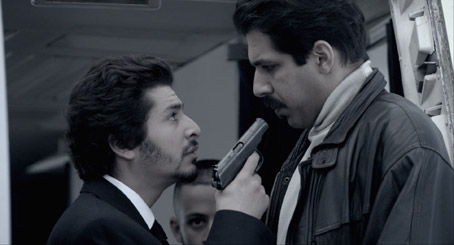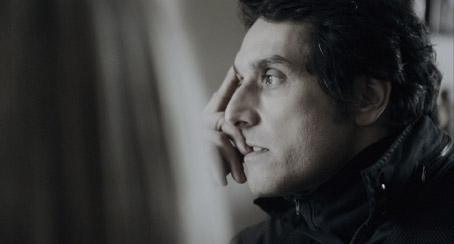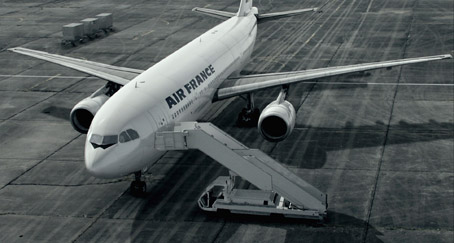|
Back in December of 1994, almost seven years before what has become modern history's most notorious terrorist attack, Air France flight 8969 was hijacked at the Houari Boumedienne Airport in Algiers by four members of the Armed Islamic Group (Groupe Islamique Armé, or GIA), who intended to fly the plane to France and explode it over the Eiffel Tower. Very little went to plan. Having boarded the plane dressed as Algerian presidential police, their status as terrorists was exposed earlier than intended and they were unable to take off because the boarding stairs were still attached to the plane. Even when they began executing passengers, the Algerian authorities refused to move the stairs, and instead brought the mother of group leader Yahia to the airport to plead with her son to abandon his mission. By the time the aircraft was cleared for take off, its auxiliary power unit had swallowed up so much fuel that the there wasn't enough left for the plane to reach Paris. The hijackers thus elected to land at Marseille Provence Airport and refuel there, which allowed the French equivalent of the American SWAT unit, the Groupe d'Intervention de la Gendarmerie Nationale, to make the preparations they needed to storm the plane.
Right from the start, director Julien Leclercq, whose first film was the intriguing if not wholly satisfying science fiction thriller Chrysalis, appears determined to recreate the whole event in convincingly realistic manner and stick a closely as possible to the reported facts. Paul Greengrass's seminal United 93 is clearly the key inspiration here, and there's a logic to this given that the Air France hijacking plays like a small scale trial run for the attacks that took place in America on 11th September 2001. And if you're looking for a guide on how to shoot a riveting docudrama then you could find no better teacher, but Greengrass set the bar pretty damned high, and if the lesson is United 93 then you'd better pay close attention to all it has to teach you. And that, for me at least, is where Leclercq finds himself stumbling a little in Greengrass's shadow.

It's a threefold issue. First up is the camerawork, which while fine when it sits still, in common with so many recent action-led movies attempts to create a documentary feel by repeatedly twitching and reframing the camera in a manner that no half-decent documentary camera operator ever would. The really annoying thing about this technique is that it rarely feels like documentary footage at all, instead coming across as a contrived attempt to create a vérité immediacy, which is exactly what it is. Far from engaging, I usually find the process frustratingly distracting, a consistent reminder that I'm watching an artificial construct. If you want an example of how this can be done well, then look no further than the aforementioned United 93, whose camerawork was authentically documentary-like, hand-held and immediate but without that falsely applied and seemingly now ubiquitous earthquake effect. Then again, that film's cameraman, Barry Akroyd, cut his teeth on documentaries and 90s Ken Loach films, and Paul Greengrass himself started out in in non-fiction television.
Then there's the colour palette. I'm guessing that Julien Leclercq is not a big fan of colour and yearns for the days when films were shot in black and white. As it was in Chrysalis, the colour here has been drained to the point where it only just registers, which results in a picture that is effectively monochrome with a hint of colour, often tinted with a whiff of blue or brown. Such tinkering with film colour is now common, of course, made easy by the move from chemical to digital for post-production work, and to watch a film now in which the colours are even close to natural is a rare and rather wonderful thing. Here I have to presume it was a stylistic rather than logic-driven choice (I certainly don't remember news and documentary footage from the mid-90s being so lacking in colour), but one that again tends to bring home the fact that this is filmed drama rather than documentary realism.

But perhaps the biggest misstep is Leclercq's attempt to personalise events by focussing on the emotional turmoil of one specific character. Now I'm not for a moment suggesting that this is a wrong move, as character engagement is key to successful drama, but one of the notable triumphs of United 93 was its avoidance of the sort of soapy personal backstories that could so have transformed a tightly wound drama into a 70s disaster movie. Instead, we as viewers became part of a strikingly authentic collective, watching real air traffic controllers and carefully cast passengers all reacting as they may well have done in the real event. Character engagement grew out of the very real sense of sharing the experience and fears of our fellow travellers, enhanced by the knowledge of what we knew was to come. It's an option that was certainly open to Leclercq, but he instead elects to focus on Thierry P, a key (and real) member of the GIGN, who is portrayed from an early stage as a man living under a pall of impending doom. As the GIGN prepare for their mission, we watch Thierry looking melancholy, Thierry missing his family and Thierry losing his touch on the police firing range, while his wife displays an almost clairvoyant fear for her husband's safety on this latest assignment. It thus seems obvious from a disquietingly early stage that Thierry has been targeted for serious injury or death. None of which sits comfortably with faux-documentary format, particularly when it's as under-developed as this – for this viewer at least, it takes more that a short sequence of Thierry playing with his young child (a now favourite shortcut to would-be emotional engagement) to bond with him as a screen character on anything more than a superficial level.
All which tends to undermine an otherwise involving, workmanlike and sometimes compelling job. The facts of the case have largely been adhered to, with just a few small but usually plausible dramatic license deviations. The GIGN preparations and climactic assault are realistically staged, and the in-plane hijack scenes are authentically handled and peppered with details from post-hijack witness statements. The only fanciful invention (at least as far as my research has been able to confirm) is ambitious young Foreign Ministry officer Carole, who makes an expensive misjudgement before proving herself as the one person with the smarts to work out what the hijackers are really up to before it's too late. I'm guessing she was written in to add a touch of gender balance to what is otherwise a largely all-male affair.

A valiant attempt to faithfully dramatize an important event in French and Algerian political history whose significance is too often over shadowed by the event it grimly foreshadowed, The Assault is still a somewhat contradictory beast. It's clearly struck a chord with a fair number of viewers and is certainly worth seeing for its realistic handling of the factual elements. It's a shame that this approach is ultimately compromised by distracting visual ticks and an unnecessary and uninvolving personal drama.
Framed in its original ratio of 1.85:1, the HD image here is somewhat at the mercy of a camera style that rarely sits still long enough to allow fine detail to register. On the rare near-static shots, particularly those of the airport buildings or the airplane exterior, the strong level of detail is easier to appreciate. The anaemic colour palette also seems to take the edge off the sharpness, providing a picture made up more of tones than edge-defining colours and shades. The contrast, surprisingly, is uniformly good, with even shadow detail registering clearly.
The soundtrack choice is between LPCM 2.0 stereo and DTS-HD Master Audio 5.1 and the DTS track wins hands down, having a far more inclusive and dynamic mix, making effective use of the entire sound stage and boasting a couple of impressively thunderous rumbles with the plane is or taxiing or powering up. The use of the surrounds for the climactic gunfire is splendidly handled.
All we have here is a Trailer (2:18), which pushes the film's thriller rather than true-story credentials.
Documentary and under-developed personal drama make for uneasy bedfellows, and while many have been prepared to tolerate and even embrace the former to appreciate the latter, I'm less comfortable with the partnership, which is compounded further by the distancing colour drain and twitchy camerawork. But there's still some very good stuff here (the scene in which coffins are being laid out in preparation for potential victims of the assault is beautifully understated), and the hijacking and subsequent GIGN operation have been faithfully and sometimes grippingly dramatized. A decent enough transfer, given the limitations set by the games played with the picture, but nothing substantial in the way of extra features.
|